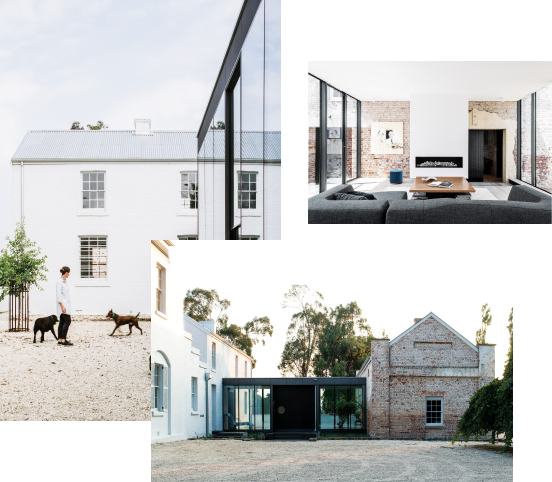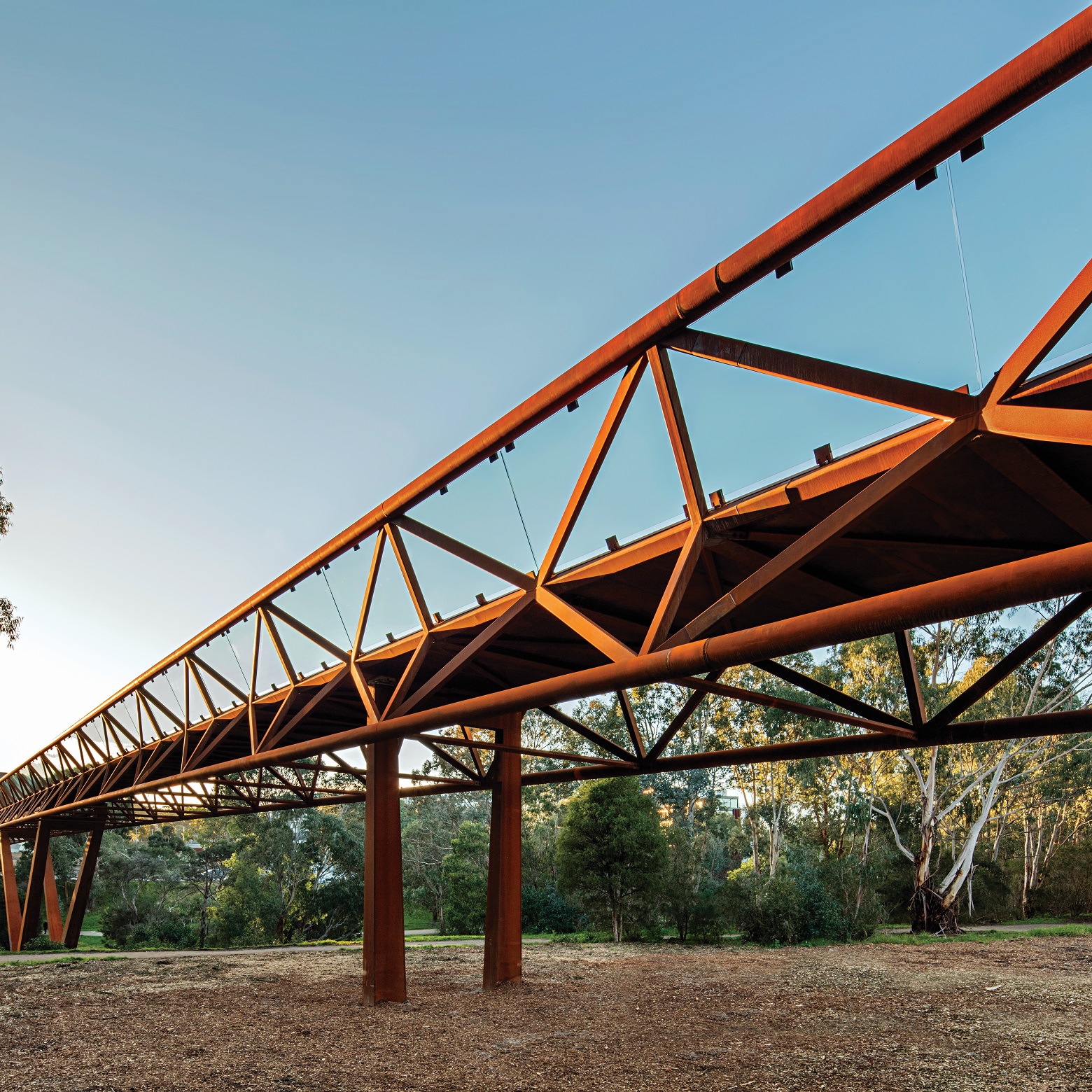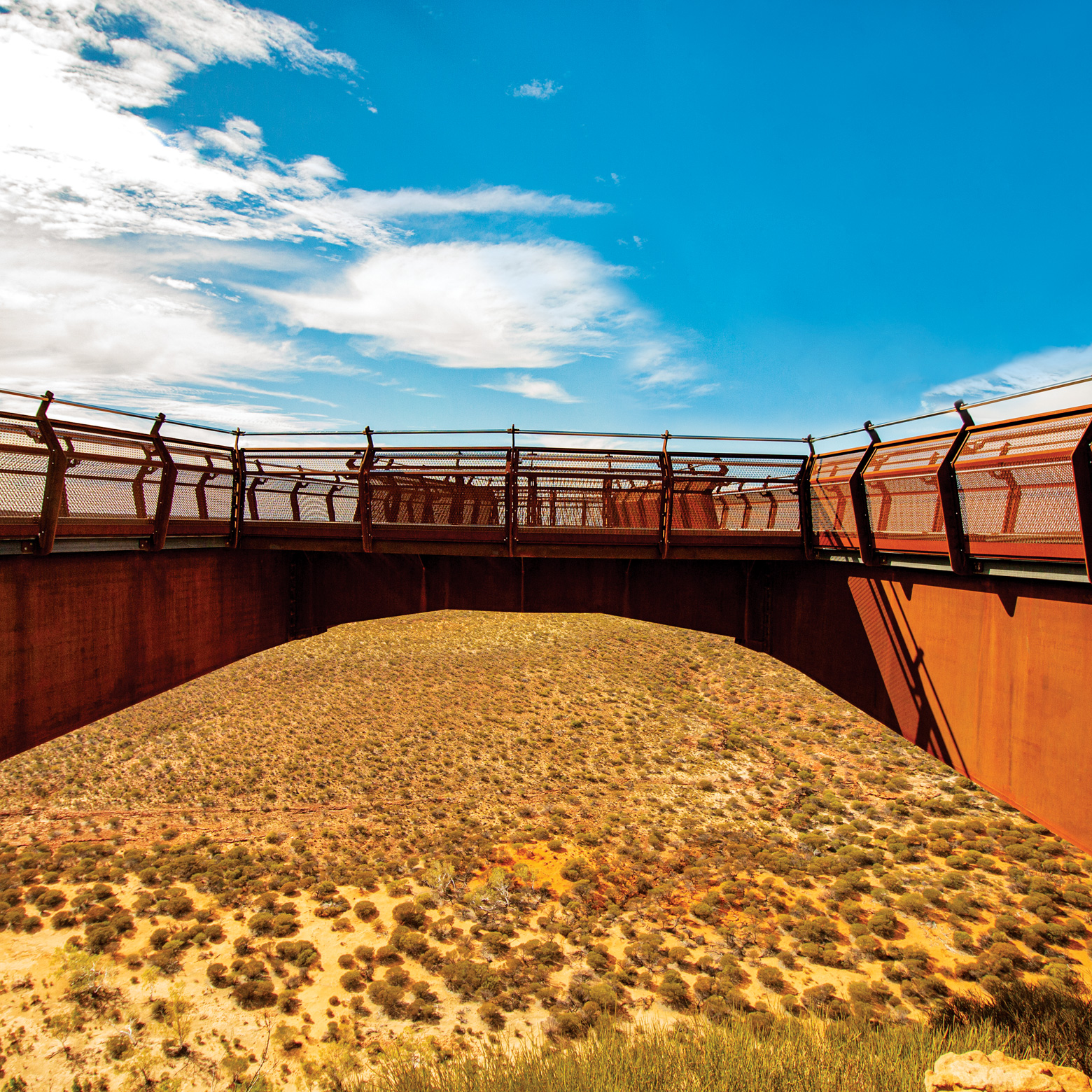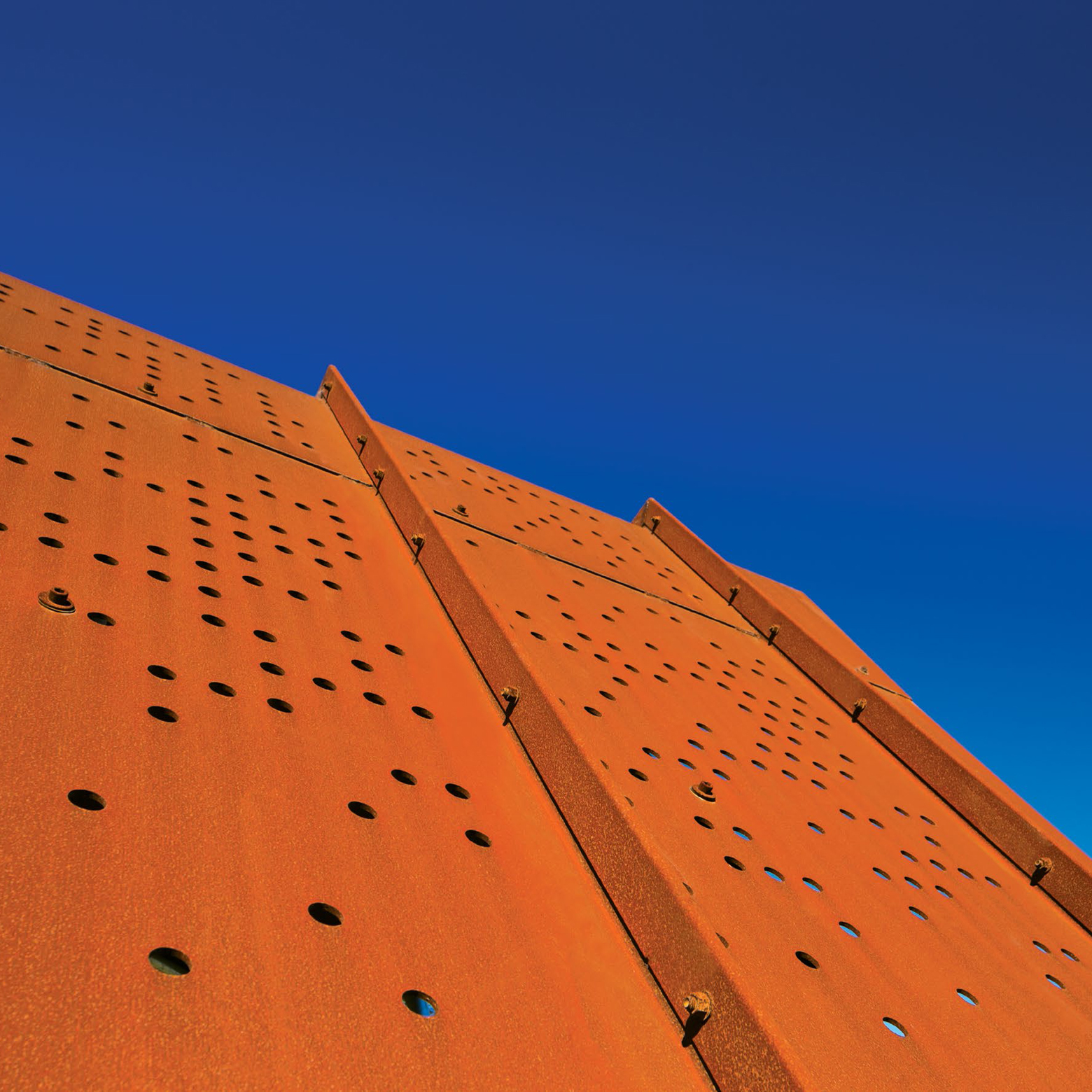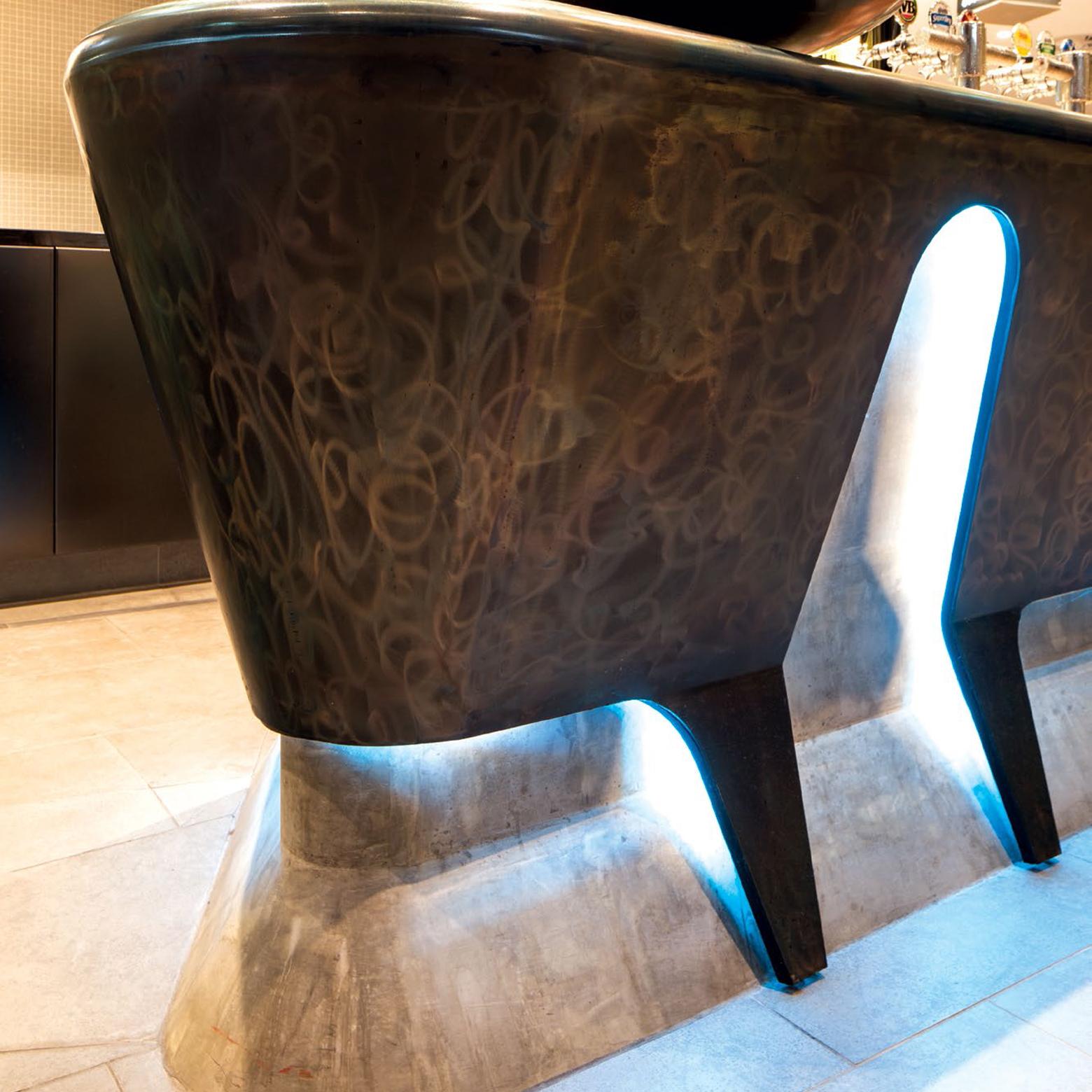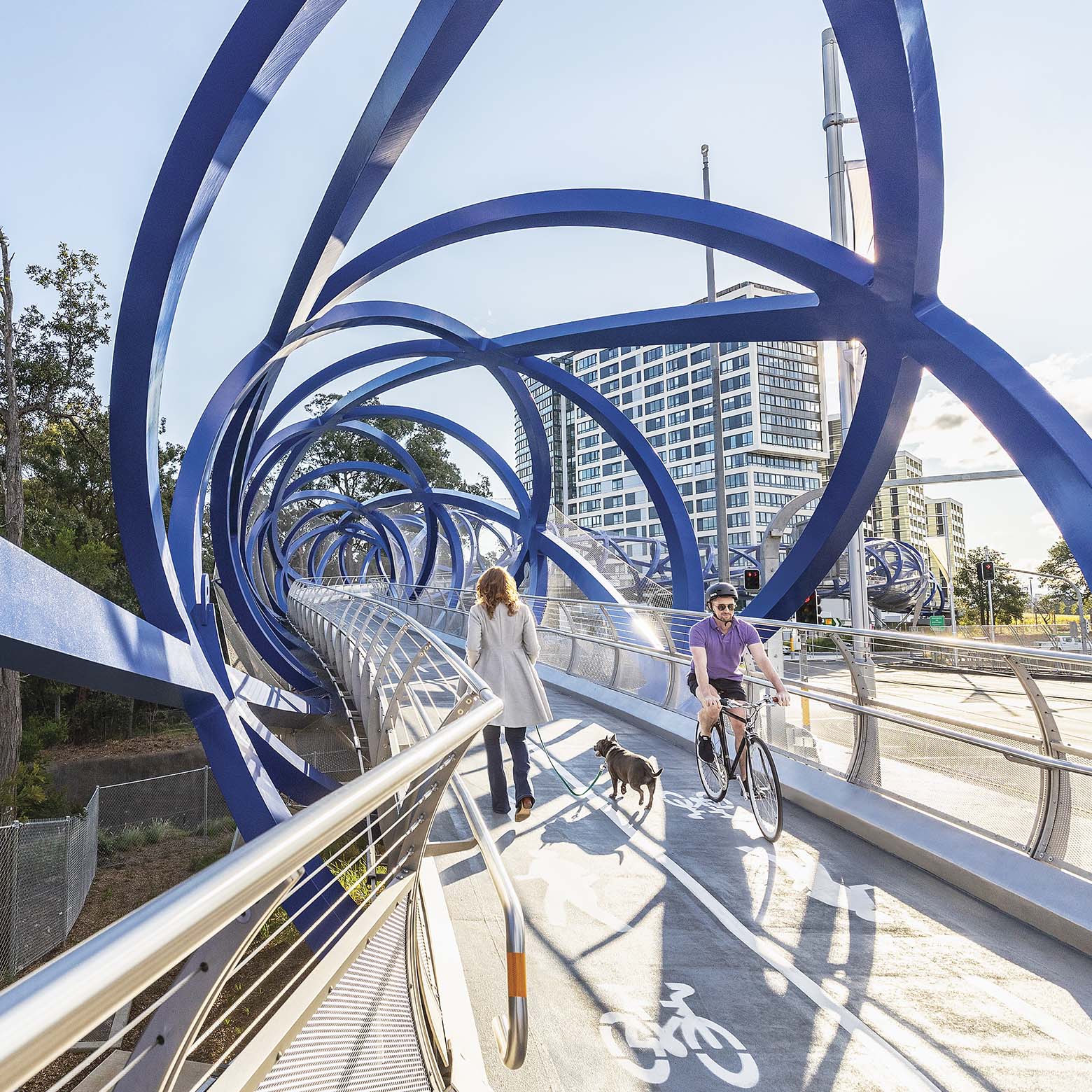
Koombana Bay Foreshore Pedestrian Bridge
A pedestrian bridge – proudly adorned with sculptural ribs made from XLERPLATE® steel and TRU-SPEC® steel – is an evocative landmark in this rejuvenating coastal city.
Words: Rob Gillam.
Photography: Jackie Chan
Project Summary
Re-using original steel foundations, the design for this new pedestrian bridge with its sculptural ribs made from XLERPLATE® steel and TRU-SPEC® steel draws inspiration from whale bones and shipwrecks.
Sunken Treasure
Having recently undergone extensive redevelopment, the roughly one-kilometre stretch of foreshore at Koombana Bay is a lovely place to be. The area has a darker past, though, with many early mariners cruelled by the bay’s north-west gale that has trapped a known 15 sailing ships in its shallows – the last being wrecked in 1923. These shipwrecks were one of the inspirations Phil Gresley of Gresley Abas drew from, for the bridge design.
“Our brief was to better connect the new foreshore with a 5-metre wide pedestrian bridge that spans over the inlet,” says Gresley. “We wanted to create a landmark but it was important to give it meaning, not just do something fancy. We wanted to draw from the knowledge of the site and connect back to that.
“This is such an important place for the Elaap Wadandi (Saltwater) people. Conversely, there are these historical elements of whaling, bones and emerging hulls of wrecked ships. The bridge also references storms and projects a visual effect onto its white ribs via a programmable lighting system.
“The bridge can be interpreted in many different ways, but it is all related to its place and that generated the design idea,” Gresley says.
Charged with overseeing the wider foreshore development, engineers Cardno worked with the architects to refine the structural system for the bridge’s arching ribs made from XLERPLATE® steel in AS/NZS 3678-250 grade and TRU-SPEC® steel coil plate in AS/NZS 1594-HA250 grade – predominantly in 12mm and 8mm thicknesses.
Cardno’s senior principal, Geoff Pereira, says the rib design went through a series of design evolutions before arriving at a cross-section which was both structurally efficient and also simple to fabricate. “An open angle's shape is rigid, but able to twist easily – much like the shape of a flat plate or perhaps a ruler on your desk,” Pereira says. “We required a closed section, or tube section, which is rigid and also ‘torsionally’ stiff.
“Working collaboratively with Gresley Abas, our teams conceived a rib cross-section which comprised two folded angle sections that were nested toe-to-toe. The shape developed was structurally efficient whilst also being efficient to manufacture using traditional steel fabrication methods. Interestingly, the final shape echoed that which nature has evolved for a whale rib.”
Cardno then asked local steel fabricators, Hotweld, to work up a full-sized prototype as proof of concept and to confirm the proposed steel fabrication methods and the suitability of the final shape, and finishes. The prototype also contractually represented the quality to be achieved during manufacture of the remaining ribs.
“The shape developed was structurally efficient whilst also being efficient to manufacture using traditional steel fabrication methods. Interestingly, the final shape echoed that which nature has evolved for a whale rib.”
Geoff Pereira Senior Principal, Cardno
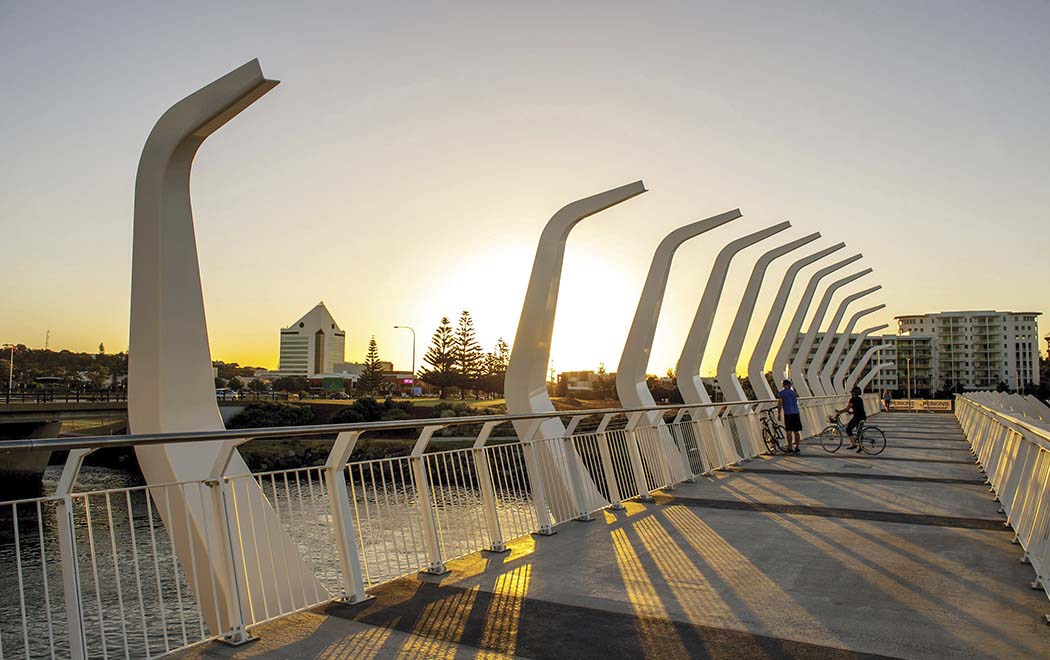
Hotweld director Rick Cassagrande says collaborating on the prototype was a welcome challenge. “The prototype was a bit finicky, but we’re not scared of jobs like that,” he says. “It was about interpreting the drawings and getting the detail right, then making sure we could make it work by rolling and pressing the XLERPLATE® steel correctly.
“Then it was about getting it how we wanted it, visually, because in this case it had to perform visually as well as structurally. We had to take extra care to get the aesthetic that the architect wanted and we think the final effect is rather nice.”
Both architect and engineer take great pride in the way locals have embraced the project. “To have people appreciate the projects you’re involved in is pretty neat and this one is well-regarded by the community – everyone talks about it,” says Cardno’s Pereira.
“The city is trying hard to create something special to draw people in. Everyone heads to our Margaret River wine country and the roads run around Bunbury so people skirt around it, but as a result of the bridge I’ve gained a greater appreciation of the city. It has renewed my interest in the area and I have taken my family back a few times to enjoy it.”
Phil Gresley agrees: “The community reaction has been wonderful. I get to regularly visit Bunbury and it’s great to engage with the bridge in action. I’m really proud of our work but I think the community also exude a certain pride about it.
“Bunbury is going through a wonderful contemporary transformation. It has some pretty sophisticated public art and provides a high level of amenity for residents and visitors.
“I see the bridge as sculptural but as an architect I don’t consider it steel art. It’s a landmark structure and a piece of interpretation. It embeds the place into its design, intertwining Indigenous and European narratives and the steel helps achieve that.”
Project information
Architect
Gresley Abas
Project
Koombana Bay Foreshore Pedestrian Bridge, Western Australia
Awards
- 2019 Australian Institute of Architects Western Australia Chapter Awards – Urban Design
- 2019 Australian Coastal Award – Annual Achievement
- Parks & Leisure Australia Awards for Excellence – Park of the Year
Location
Koombana Bay Foreshore, Anchorage Cove, Bunbury WA 6230 View on Google Maps
Copyright © 2019 BlueScope Steel Limited ABN 16 000 011 058. All rights reserved.
No part of this publication may be copied, reproduced or distributed without consent. BlueScope Steel Limited, to the extent permissible at law, is not liable to any person for loss or damage arising from reliance upon information contained in this publication. The articles featured in this edition of STEEL PROFILE® are sourced, written, fact-checked and curated by the authors with editorial contribution from BlueScope Steel Limited. Any statements or opinions attributed to a person are the views of that person alone and do not necessarily reflect those of BlueScope Steel. The decision to use any particular product or material in the projects featured in this publication was made by the team involved in each project and not BlueScope Steel Limited. While care has been taken to verify the accuracy of details in this publication, BlueScope Steel Limited assumes no responsibility or liability for any errors or omissions in the content of this publication. All information is provided with no guarantee of completeness or accuracy.
Images shown throughout have been reproduced to represent actual product colours as accurately as possible. However, we recommend checking your chosen colour against an actual sample of the product before purchasing, as varying screens and devices may affect colour tones and finishes.
Every project is different and not all products are suitable for all applications, projects and environments. You should confirm the suitability of particular products for your project by contacting the supplier directly and by obtaining information and advice specific to your circumstances.
To determine whether a BlueScope warranty may be available for use of a product in your particular project, please visit bluescopesteel.com.au/warranties.
BlueScope, XLERPLATE® and TRU-SPEC® are registered trademarks of BlueScope Steel Limited.
Submit your project
We encourage you to share your projects for consideration in a future issue of STEEL PROFILE® magazine. We invite you to submit projects that feature a ground-breaking or an innovative use of steel. We love celebrating and writing about such projects!

